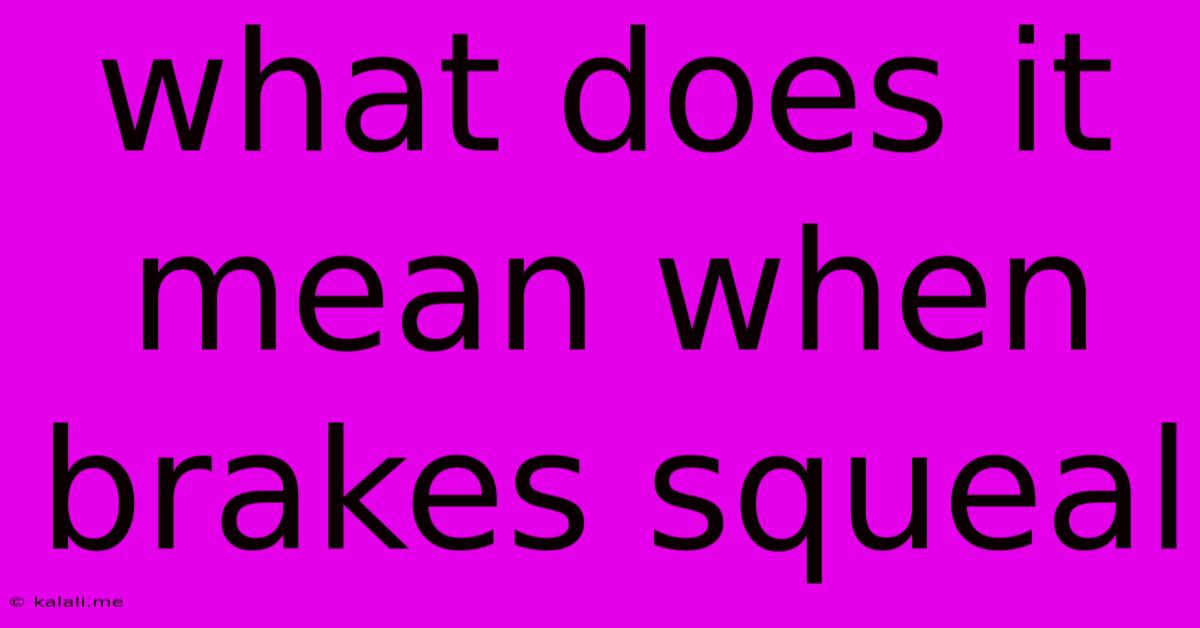What Does It Mean When Brakes Squeal
Kalali
May 31, 2025 · 3 min read

Table of Contents
What Does it Mean When Brakes Squeal? A Comprehensive Guide
Brakes squealing is a common car problem that many drivers experience. That high-pitched shriek emanating from your wheels isn't just annoying; it's a signal that something's amiss with your braking system. Ignoring it could lead to more serious issues, potentially compromising your safety. This guide will explore the various reasons behind brake squealing, how to identify the cause, and what steps to take.
Why Do Brakes Squeal?
Brake squeal is usually caused by friction between components of your braking system. While some squealing is normal, especially in new brakes, persistent or loud squealing warrants immediate attention. Here are some of the most common culprits:
Worn Brake Pads
This is the most frequent cause of brake squeal. Brake pads have wear indicators—small metal pieces embedded in the pad—that make contact with the rotor when the pads are almost completely worn. This contact creates the characteristic squealing sound. Ignoring this warning sign can lead to rotor damage and complete brake failure.
Damaged or Worn Rotors
Over time, your brake rotors can become warped, scored, or excessively worn. This uneven surface creates vibrations that translate into squealing sounds as the brake pads make contact. Inspecting your rotors for scoring, grooves, or excessive rust is crucial.
Loose or Damaged Brake Components
Loose caliper pins, mounting brackets, or other brake components can cause vibrations and squeal. These components play a crucial role in the proper functioning of your brakes, and their damage or looseness compromises braking performance. Regular inspection and lubrication are essential preventative measures.
Foreign Material Trapped in Brakes
Sometimes, small stones, pebbles, or debris can get lodged between the brake pads and rotors. This foreign material disrupts the smooth contact between the pads and rotors, leading to squealing. Regular cleaning of your brake system can help prevent this.
Glazed Brake Pads
Overheating the brakes during heavy braking or prolonged downhill driving can glaze the brake pads, reducing their effectiveness and causing squealing. Glazed pads have a hard, glassy surface that reduces friction and results in poor braking performance. Avoid harsh braking where possible and ensure your braking system remains adequately ventilated.
Low Brake Fluid
While less directly related to the squealing itself, low brake fluid can indirectly contribute to brake problems including squealing. Low fluid levels suggest a leak in the system, potentially impacting brake pad contact and leading to abnormal noises. Regularly checking and topping off your brake fluid is crucial for safety.
How to Diagnose the Source of Squealing
Pinpointing the exact cause of brake squeal requires a closer look. While some issues like low fluid are easily checked, others might require a mechanic's expertise:
- Visual Inspection: Check brake pads for wear and tear, rotors for damage, and examine calipers and other components for looseness or damage.
- Listen Carefully: Try to pinpoint the location of the squeal. Is it coming from the front or rear brakes? This helps narrow down the source.
- Test Drive: Pay attention to the braking performance. Does the squealing occur consistently, or only under specific conditions (e.g., hard braking)?
- Professional Inspection: If you're not comfortable inspecting the brakes yourself, schedule a visit with a qualified mechanic.
When to Seek Professional Help
If the squealing is loud, persistent, or accompanied by other symptoms like vibrations or spongy brakes, seek professional help immediately. Ignoring brake issues can be dangerous and lead to costly repairs.
By understanding the common causes of brake squeal and taking preventative measures, you can keep your brakes functioning optimally and ensure your safety on the road. Remember, regular brake maintenance is crucial for preventing serious issues and ensuring your vehicle remains roadworthy.
Latest Posts
Latest Posts
-
How Do I Find The Plumbing Diagram For My House
Jun 01, 2025
-
Sql Group By Month And Year
Jun 01, 2025
-
Mid 2012 Macbook Pro Ram Capacity
Jun 01, 2025
-
What Should The Pressure Be In A Well Pressure Tank
Jun 01, 2025
-
Why Did Morgan Leave Criminal Minds
Jun 01, 2025
Related Post
Thank you for visiting our website which covers about What Does It Mean When Brakes Squeal . We hope the information provided has been useful to you. Feel free to contact us if you have any questions or need further assistance. See you next time and don't miss to bookmark.